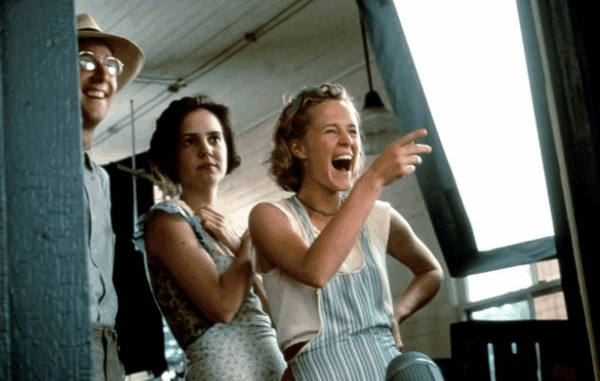
The Threat Returns
Throughout Fried Green Tomatoes, the characters’ lives are shaped not only by love and loss but by looming threats—none more menacing than Frank Bennett. Ruth Jamison’s abusive husband, Frank, represents the very worst of patriarchal power: charming in public, monstrous in private. When he reappears in Whistle Stop to reclaim his son, he brings with him the fear and trauma Ruth worked so hard to escape. But what follows is one of the film’s most morally complicated and emotionally charged scenes—the moment when Sipsey, a Black domestic worker, quietly but decisively kills Frank to protect the child and the family.
This is not just a turning point in the story; it is a moment of radical justice, where an act of violence becomes an act of salvation, and where the most marginalized character on screen becomes the quiet hero.
Sipsey: Quiet Strength, Deep Roots
Played with profound grace and subtle power by Cicely Tyson, Sipsey is a character who often remains in the background—cooking, cleaning, helping raise children, and offering quiet wisdom. But she is never merely a servant. She is, in many ways, the emotional bedrock of the Threadgoode household and the moral compass of the café.
Sipsey is both maternal and strategic. She has survived in a world that grants her no power by cultivating influence in subtler, deeper ways. Her love for Ruth, Idgie, and especially the child—Buddy Jr.—is not just loyalty born from duty; it is familial and fierce. She is part of their chosen family, and like any mother, she protects her own.
So when Frank Bennett arrives at the café, drunk, violent, and full of entitlement, Sipsey does not hesitate. She doesn’t scream. She doesn’t beg. She acts.
The Moment of Truth
The scene unfolds quickly. Frank bursts into the café, threatening to take his son by force. His rage fills the room. The child is terrified. Idgie tries to hold him back, but it’s Sipsey who makes the choice that changes everything. She strikes Frank with a cast-iron skillet, killing him instantly.
There is no gore, no drawn-out struggle—just a single, decisive blow. The simplicity of the act contrasts with its enormous consequences. Sipsey’s choice is not only an act of protection; it’s a rebellion against every limitation society has placed upon her.
In 1930s Alabama, a Black woman killing a white man—especially one as connected and violent as Frank—would almost certainly have meant death. Yet Sipsey does it anyway. She does not act out of rage, but out of love, out of necessity. She knows no one else will protect this child. So she does it herself.
Community and the Code of Silence

What follows is one of the most remarkable sequences in the film: not a trial, not a cover-up rooted in fear, but a communal act of love and protection. Idgie and Big George quietly dispose of the body. The town—especially the Black and working-class community—closes ranks. No one speaks of what happened.
The cover-up is often remembered for the film’s infamous dark humor: the suggestion that Frank’s remains ended up in the café’s barbecue. The line “the secret’s in the sauce” has become a piece of pop-culture legend. But beneath the humor lies something far more serious: a portrait of radical loyalty.
This moment transcends race, gender, and class. Sipsey, a Black woman in the Jim Crow South, is protected by a white woman (Idgie), a Black man (Big George), and an entire town that understands one truth: justice, in this case, could never come from the law.
This is not vigilante justice. It is survival justice. The formal systems have failed Ruth, failed Sipsey, and failed Buddy Jr. repeatedly. So the community steps in. They build their own form of justice—not out of vengeance, but out of love.
Racial Dynamics and Quiet Defiance
It’s important to recognize the radical nature of Sipsey’s act within the context of the time. In the 1930s American South, Black women had virtually no legal or social power. Their survival depended on staying invisible, obedient, and silent. Sipsey’s decision to kill a white man—no matter how justified—was life-threatening.
Yet Fried Green Tomatoes does something rare: it portrays Sipsey not as a victim or a martyr, but as a protector. Her defiance isn’t loud. It’s not public. But it’s powerful.
Her action flips the script. In a culture where Black women were expected to serve and suffer silently, she asserts autonomy. She takes control of a moment that could have destroyed the entire family. And she does it not for herself, but for the people she loves.
The film does not exploit her heroism. It treats it with quiet reverence. There are no dramatic monologues, no grandstanding. Just Sipsey, calm and steady, holding a child, knowing what she has done—and why.
The Moral Complexity
What makes this scene so compelling is its refusal to moralize. The film never asks whether Sipsey was right or wrong. It assumes what she did was necessary. And in that assumption, it challenges the viewer to reconsider ideas of law, justice, and morality.
Frank Bennett had the law on his side. He had the power of race, gender, and money. But he did not have love. And in the end, love—not power—wins.
Sipsey’s act complicates easy narratives of good and evil. She is a killer—but only because she is a protector. She is silent—but never passive. She is a servant—but also a savior.
This moment forces the audience to sit with that complexity. It invites empathy, not judgment. And in doing so, it elevates Sipsey from supporting character to moral center.
Legacy and the Unspoken Truth
Frank Bennett disappears. Officially, no one knows what happened to him. But the viewer does. So does Evelyn, as Ninny (possibly Idgie) tells the story many years later. The truth has lived underground, passed through whispers and glances, never fully spoken.
And yet, that silence is its own kind of truth. Sipsey’s actions—and the community’s protection of her—become a part of the café’s DNA, its moral spine. That café, after all, was never just a place to eat. It was a refuge. A space where people who had been failed by the world could find safety.
That safety was made possible by people like Sipsey—quiet heroes who did what had to be done and never asked for credit.
Conclusion – Love Stronger Than Fear
Sipsey’s killing of Frank Bennett is not the emotional centerpiece of Fried Green Tomatoes, but it is perhaps its most radical moment. It redefines who gets to protect. It asks us to consider that sometimes, the most heroic acts are also the most dangerous.
In Sipsey, we see love that is not romantic or maternal in a traditional sense—but protective, sacrificial, and uncompromising. She is a woman who has spent her life in the margins, but when it matters most, she takes center stage and rewrites the story.
In that one decisive moment, Sipsey does not just save a child. She reclaims her power, rewrites the rules, and reminds us that love is not always gentle. Sometimes, love hits back.
